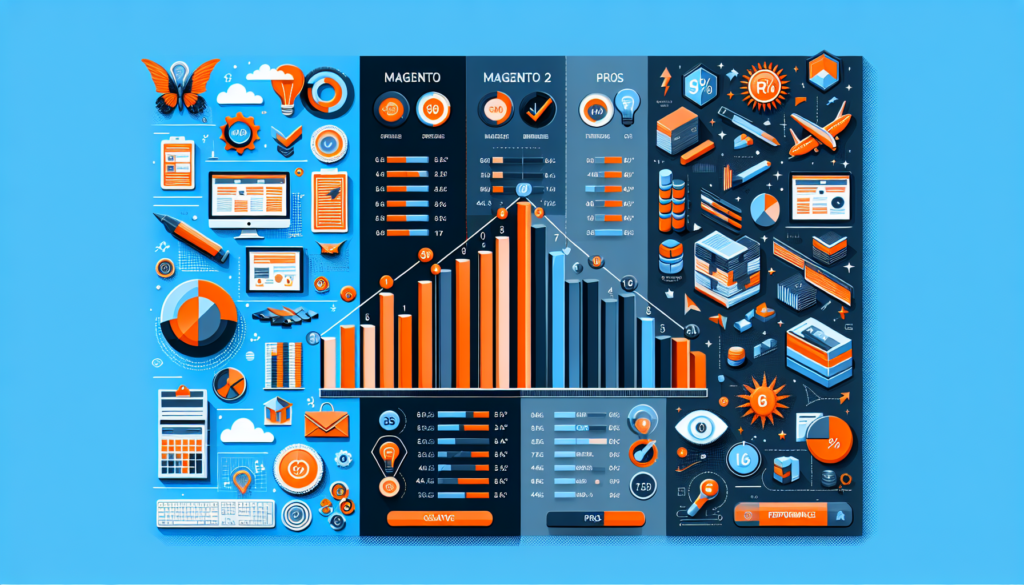In the constant evolution of e-commerce, platforms that facilitate the creation and management of online stores are critical components for the success of digital businesses. Magento, an open-source and robust content management system (CMS), has positioned itself as one of the leading options thanks to its flexibility and an extensive community of developers. However, the arrival of Magento 2 brought a series of improvements and significant changes that raise the question of which version is more suitable for today’s merchants.
Technological Evolution: Magento vs Magento 2
Magento 1, released in 2008, revolutionized the market with its open and modular architecture, allowing merchants and developers to customize and implement stores highly adapted to their specific needs. Although robust, over time, limitations regarding performance, scalability, and user experience began to be noticed compared to new technological developments.
Magento 2, released in 2015, was built to overcome these deficiencies. With a completely renewed architecture, it offered greater scalability, improved performance, and optimized experiences for both customers and administrators. Among the technical improvements, notable features include:
- Optimized database structure: Improvements in indexing and cache management to speed up queries and reduce loading times.
- Updated technologies: Use of PHP 7, HTML5, CSS3, and modern frameworks such as jQuery.
- Full Page Caching (FPC): Introduced as standard in the Community version, it allows for faster and more efficient page loading.
- Varnish Cache: Native integration with powerful HTTP/HTTPS caching solutions.
- Modular components: They facilitate custom development and simplify security and functionality updates.
Analytics and User Experience Optimization
Magento 2 presents significant advancements in analytics tools and user experience optimization, including:
- Intuitive dashboard: Geared towards analytics, it provides vital information about store performance in real-time.
- Simplified checkout: Reduces cart abandonment rate thanks to a clearer and quicker process.
- Responsive design by default: Mobile adaptability is essential for modern e-commerce, where access through mobile devices is prioritized.
Security and Compliance
With the growing focus on cybersecurity, Magento 2 has intensified its security features, such as:
- Password management system: Offers better protection against brute-force attacks.
- PCI readiness: The platform is adjusted to comply with payment card industry standards.
- Frequent security updates: More efficient implementation of security patches to protect against vulnerabilities.
Implications of Migration for Existing Businesses
Migrating from Magento to Magento 2 is a complex task that requires careful planning and execution. Among the challenges of the transition, there are:
- Data transfer: Migrating products, customers, and order data demands a meticulous process to avoid loss of information.
- Customization: Extensions and themes from Magento 1 are not directly compatible with Magento 2, which requires a reworking of existing customizations.
- Associated costs: There is a necessary investment in terms of development and time to carry out the migration effectively.
Case Studies
Businesses that have completed the migration to Magento 2 report increases in page speed by 50%, improvements in conversion rates, and a reduction in platform administration time. A notable example is a multinational retail store, which, after updating to Magento 2, observed a 20% increase in its conversion rate, along with a notable decrease in server usage during traffic peaks.
Future Perspectives and Conclusions
Although Magento 1 continues to be used, its development and official support have come to an end, posing serious security risks and obsolescence for businesses that maintain it. Magento 2, in contrast, is on a trajectory of continuous improvement, addressing the changing demands of e-commerce and modern consumers.
In a direct comparison, Magento 2 emerges as the superior option for businesses seeking an agile, secure, and future-ready platform. While the migration can present challenges, the long-term benefits in terms of performance, user experience, and scalability justify the investment.
For companies wishing to remain competitive in the dynamic world of e-commerce, Magento 2 is not only the best choice, it is the way forward to ensure sustained growth and adaptability to future trends in technology and consumer behavior. Merchants should assess their strategies, budgets, and resources to make the transition as smooth as possible and capitalize on the advantages that Magento 2 offers.

